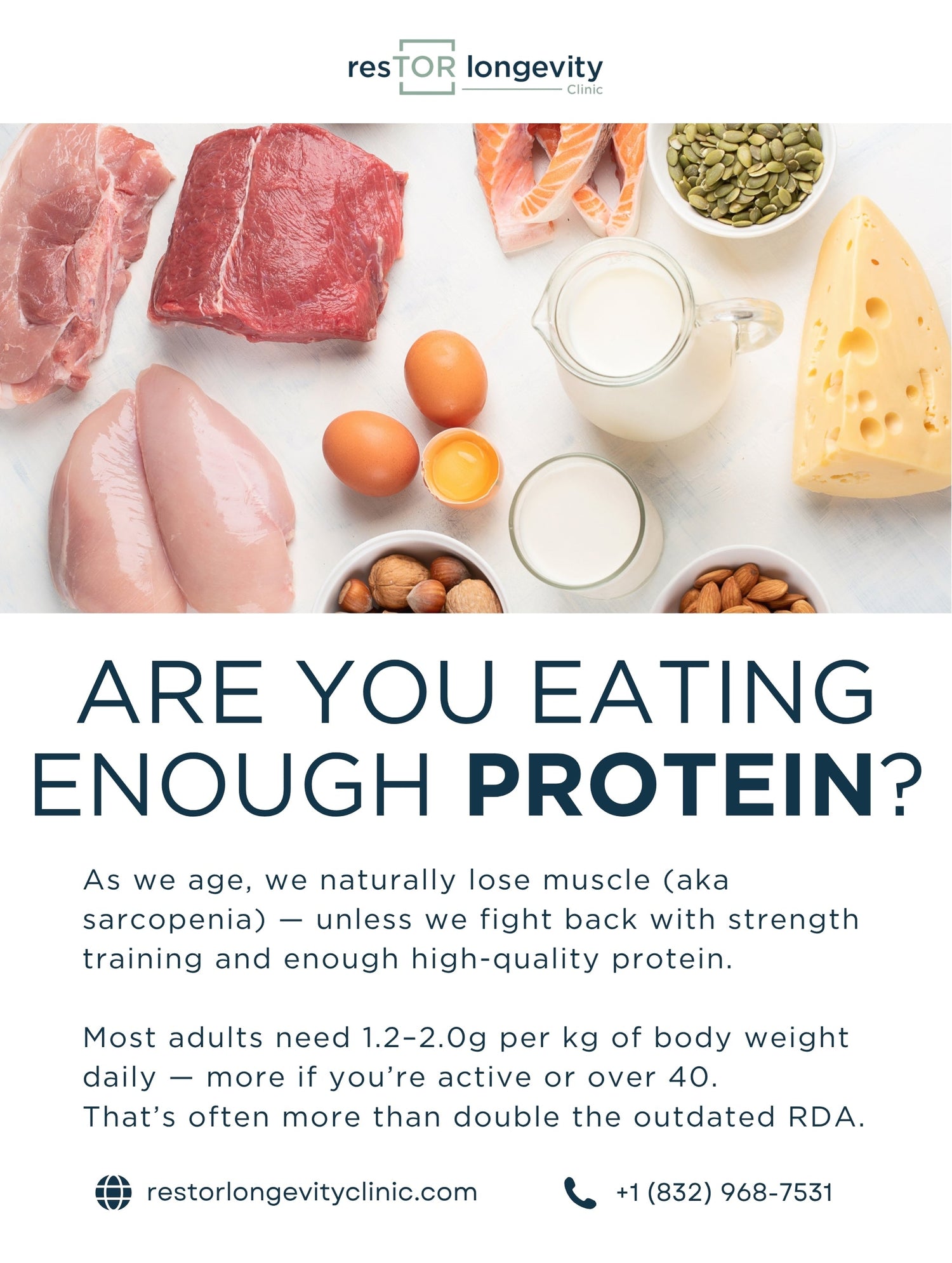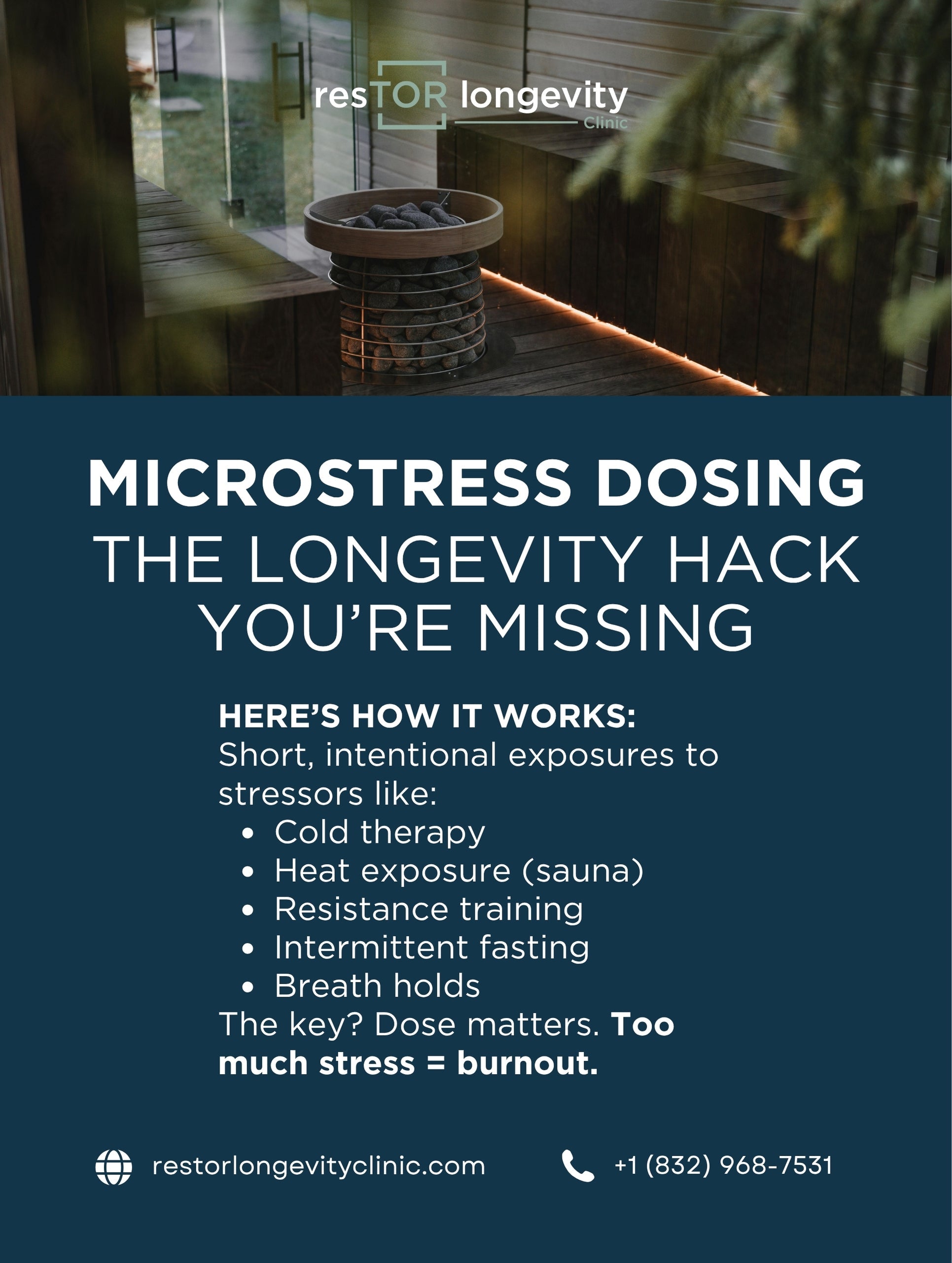Are You Eating Enough Protein? Why It Matters More Than You Think
Protein is often associated with gym routines and muscle-building. But here’s the truth: it’s one of the most critical nutrients for healthy aging and longevity—and most adults aren’t getting nearly enough.
At resTOR Longevity Clinic, we regularly assess protein intake in our clients, especially those over 40. Why? Because without adequate protein, your body can’t maintain muscle, support hormone production, or protect your immune system—all essential for extending healthspan.
Let’s break down why protein matters and how to make sure you’re getting what your body truly needs.
Why Protein Is So Important As You Age
Protein is made up of amino acids—the building blocks of nearly every structure and function in your body. From muscle fibers to neurotransmitters, enzymes to immune cells, protein fuels the systems that keep you healthy, mobile, and mentally sharp.
Here’s what protein directly supports:
-
Muscle maintenance and growth
-
Hormone and neurotransmitter synthesis
-
Immune function and tissue repair
-
Skin, hair, and nail health
-
Metabolic rate and fat regulation
Without enough protein, your body simply can’t perform or repair at its best.
The Hidden Epidemic: Sarcopenia
As we age, one of the most significant threats to healthspan is sarcopenia—the natural, gradual loss of muscle mass and strength. This decline doesn’t just impact your physical appearance—it increases the risk of:
-
Frailty and falls
-
Slower metabolism and weight gain
-
Insulin resistance
-
Poor mobility and independence
The good news? Sarcopenia is preventable and even reversible with two key interventions: strength training and adequate protein intake.
How Much Protein Do You Really Need?
The Recommended Daily Allowance (RDA) for protein—0.8g per kg of body weight—is the bare minimum to prevent deficiency, not to thrive or age optimally.
Research now shows that for healthy aging, active adults, and anyone over 40, the ideal intake is 1.2–2.0 grams of protein per kilogram of body weight per day.
Let’s do the math.
For a 150-pound adult (68 kg), that’s:
-
Low range (1.2g/kg): ~82g of protein/day
-
High range (2.0g/kg): ~136g of protein/day
If you’re recovering from illness, dealing with inflammation, training regularly, or trying to preserve lean mass, you’ll likely benefit from the upper end of this range.
High-Quality Protein: What to Look For
Not all protein is created equal. The best sources of protein are those that are complete (containing all nine essential amino acids) and highly bioavailable (easily absorbed and used by your body).
Top choices include:
-
Animal proteins: Eggs, poultry, grass-fed beef, wild-caught fish, Greek yogurt
-
Plant-based options: Tofu, tempeh, quinoa, lentils, hemp seeds (may require combining sources)
-
Supplements: Whey or plant-based protein powders can help fill gaps in a busy lifestyle
Spacing protein evenly across meals—rather than loading up at dinner—can also improve absorption and muscle protein synthesis throughout the day.
Protein Timing and Resistance Training
Protein works best when paired with resistance training—another longevity essential. Lifting weights or using resistance bands stimulates your muscles, and protein provides the fuel for repair and growth.
For optimal results:
-
Aim to eat 20–40g of protein within 1–2 hours after strength training.
-
Combine protein + fiber + healthy fats in each meal to support satiety and blood sugar balance.
At resTOR, we often incorporate muscle mass assessments and DEXA scans into our baseline testing to personalize protein and fitness goals for each patient.
Signs You May Be Undereating Protein
Many people aren’t aware they’re under-consuming protein until symptoms show up, such as:
-
Muscle loss or weakness
-
Slow recovery from exercise or injury
-
Frequent illness or poor immunity
-
Thinning hair or brittle nails
-
Cravings for sugar or frequent snacking
If any of these sound familiar, it may be time to take a closer look at your intake.
What We Do at resTOR Longevity Clinic
At resTOR Longevity Clinic, protein intake isn’t just a nutrition metric—it’s a biomarker of resilience.
We evaluate:
-
Body composition and lean muscle mass
-
Metabolic function and inflammation markers
-
Dietary intake and absorption efficiency
-
Activity levels and training recovery
From there, we build a customized protein and lifestyle strategy to support strength, metabolism, and cellular repair as you age.
Takeaway: Protein Is Your Ally in Aging Well
It’s not just about hitting the gym or building muscle—it’s about preserving your independence, protecting your metabolism, and extending your healthspan.
So, are you eating enough protein?
If you’re not sure, book a consultation with resTOR Longevity Clinic. We’ll help you understand your body’s unique needs—and build a plan that supports strength, energy, and longevity for years to come.



